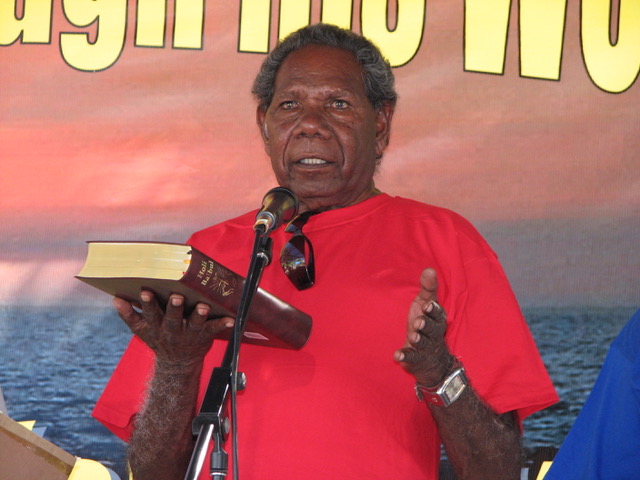Pioneer pastor leaves a rich legacy
Michael Gumbuli Wurramara was Australia’s senior Aboriginal priest for more than 40 years
Gumbuli has gone to be with his Maker. The Reverend Canon Michael Gumbuli Wurramara, AM, one of Australia’s most significant Aboriginal church leaders passed away on July 28.
He was born on Bickerton Island, in the Gulf of Carpentaria in 1935, but soon moved to Groote Eylandt. Living near the mission, his father helped supply the mission with seafood. Few Europeans ventured that way.
For some time he lived in the Mission boarding house, visiting his parents every afternoon – he liked the food at the mission. Aged nine years, he decided to follow the ways of Jesus, and never wavered from that course.
When he was 14 years, with his brother, he moved 300km to Roper River Mission, now known as Ngukurr, paddling a dug-out canoe.

The mighty Roper River at Ngukurr
There, Gumbuli learned motor mechanics from the missionaries, a skill he practised throughout his life. He became involved in local issues, such as housing and the community shop. This was at a time when the government took control of the mission and made many disastrous mistakes, especially disempowering local leaders. Gumbuli soon learned how decisions were made and was well able to argue a cause in debate.
He became increasingly involved in the life of the Church, tutored by some of the older Aboriginal Christians in the community, such as Barnabas Roberts. The missionaries also assisted with Bible teaching.
In 1972 the community was without a priest. Some of the faithful old ladies of the church prevailed upon their bishop, “What about Gumbuli? He could be our leader!” Gumbuli explained it this way: “I was chosen by the old people to be the leader and later their minister. I was not chosen by the white people.” In November 1973, Gumbuli was ordained Deacon, and then Priest.
He was only the second Aboriginal person to be made a priest in the Anglican Church. The first man died in 1974, so that Gumbuli was Australia’s senior Aboriginal priest for more than 40 years.
There were no models for him. Nobody had experienced the worlds he faced, especially as he lived in Arnhem Land where traditional culture was still alive. He was determined that the local response to the gospel should be authentically Aboriginal – 100 per cent Aboriginal and 100 per cent Christian.
Gumbuli was Australia’s senior Aboriginal priest for more than 40 years.
Gumbuli pioneered an approach to funerals that honoured traditional ways, as well as Christian commitment. The “ceremony men” would dance the coffin to near the church. From here, Christ was honoured and Gumbuli took control of the service in the church until the coffin was returned to the same spot, where the same men took over once again. At the cemetery, Gumbuli would undertake the committal.
This resolution allowed Aboriginal traditions to coexist with dignity, and did not require any compromise of the gospel. It allowed for flexibility, depending upon the family’s wishes. One anthropologist concluded that at Ngukurr, “it looks … as though Aborigines want to live in accord with two laws kept apart in thought and action.”
There were many issues needing resolution, some arising from Christianity, some from Australian law, such as polygamy, choice of marriage partner, attitudes to women and violence.
Even today, belief in an active spirit world influences much thinking in Arnhem Land. As an example, a sudden death can be interpreted as resulting from one person calling upon an evil spirit to end the life of another. Thus, if someone died, there was a need to identify the one who summoned the spirit, and then punish them. This led to a theme that Gumbuli often used at funerals reminding people that “This death was a natural event; it was not the result of evil spirits and does not generate any need for payback.”
For Gumbuli, spirits were not to be feared; the Holy Spirit was the strongest spirit, and could defeat any threat.
Gumbuli and his fellow leaders often faced questions of the relationship between traditional ceremonies and Christian theology. He would say that Christians needed to be suspicious of anything that challenged God’s role as Creator. It is a very useful principle to apply in many situations.
He suggested that the native Kriol speakers should translate an English text themselves, rather than professional linguists
Gumbuli was an independent thinker – he had to be. He challenged others to be the same. He wanted everyone in his community to read the Bible and make up their own mind about it. As Kriol is the first language of Ngukurr, and widely used elsewhere, he thought the whole Bible should be available in Kriol.
This led Gumbuli to propose a novel way of translating the Bible. He suggested that the native Kriol speakers should translate an English text themselves, rather than professional linguists. Then theologians and linguists should check the translation, returning it to ensure meaning, and so on. This resulted in the launch of the complete Kriol Bibul in 2007.
From very early days in his ministry, Gumbuli encouraged the participation of women. Curiously, at one stage, Gumbuli supported the ordination of women, while at least one missionary declared that traditional Aboriginal men would not accept women as leaders! He recognised that it was women who gathered at the foot of the Cross.
Gumbuli’s influence extended well beyond his community; he was seen as the leader of all Aboriginal Anglicans across the Territory and beyond. He was a warm-hearted pastor and was frequently sought out to act as a mediator and peacemaker. This was recognised when he was awarded the honour of Member of the Order of Australia in 2010.
“If you want to be a leader you must do your actions the right way, and through love.” – Gumbuli
I think that it is a sign of a saint that they have a vision of Christ that brings humility, and a sense of unworthiness in the face of God; this was certainly the case with Gumbuli. An inevitable consequence is caring for people with genuine warmth and compassion. In this he was ably supported by his wife Dixie, who passed away in 2001.
Whatever else might be said about Gumbuli, the authenticity of his personal life and faith stands out. His willingness to minister in the most frustrating circumstances reaches back to times when the community was first crippled by alcohol – introduced by government contractors. At the time, the radical union leader Dexter Daniels said that it was only Gumbuli and the Senior Nurse, Sister Edna Brooker, who held the community together.
It is appropriate to let Gumbuli have the last word:
“If you want to be a leader you must do your actions the right way, and through love. People are watching you and looking at the way you love them and support them. Your actions must come from deep in your heart.”
Dr Murray Seiffert’s biography, Gumbuli of Ngukurr: Aboriginal Elder in Arnhem Land [Acorn Press] was awarded the 2012 Australian Christian Book of the Year, and is available through Koorong.
Email This Story
Why not send this to a friend?


